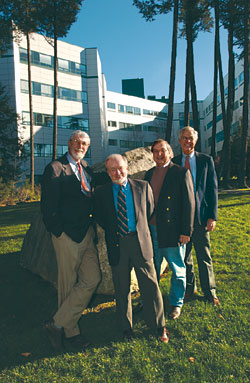Vital Signs
Five more faculty members join the ranks of the newly "retired"
Several more faculty members joined the emeritus ranks during the last year. All of them are keeping busy in retirement—and some even continue to teach and practice medicine.
Peter Mogielnicki, M.D., a professor of medicine, says, "I feel like I'm more professionally productive now than when I was working." The chief of medicine since 1977 at the White River Junction, Vt., VA Medical Center, he kept plenty busy seeing patients, teaching, and dealing with administrative matters.
In retirement, he still sees patients two days a week and teaches at DMS. But he's no longer "shuffling papers," as he puts it, so he has time to do something he's always dreamed of—explore opportunities in international health.
He and his wife, Nancy, a pediatric physician's assistant at DHMC, "have made a commitment to sampling a variety of venues in international health," he says. So far they've worked at a rural clinic in Honduras, and in March they'll be teaching nonphysician providers in rural Thailand. He is also interested in getting first-hand experience with international disease-eradication programs.
Charles Marrin, M.B., B.S., a professor of surgery, retired early to avoid the risk, he says, of "dying in the harness. . . . I found I was able to do nothing but heart surgery. I'd come home, have supper, fall asleep over the newspaper, go to bed, and get up in the morning."
He's now spending time with his family, his church, a school he's on the board of, and other community organizations. He even has time to go for walks— on snowshoes in the winter— with his wife and dogs.

|
|
These recent DMS retirees are, from
the left, Robert Cimis, Bill Culp, Charles
Marrin, and Peter Mogielnicki. |
Marrin was born in Santa Monica, Calif., but raised and educated in England. He returned to the U.S. for his surgical residency at Columbia and joined the DMS faculty in 1981. He has been very involved in national quality-improvement efforts and in 1987 helped found the Northern New England Cardiovascular Group, a regional consortium aimed at improving heart surgery outcomes.
Robert Cimis, M.D., an associate professor of medicine, arrived at Dartmouth in 1969 as a senior medical resident. He soon became fascinated with gastroenterology and so in 1970 "drafted a proposal to institute a gastrointestinal fellowship here at DHMC and nominated myself as the first trainee." Since then, he adds, "many successful and notable gastroenterologists have graduated from our program." Cimis also did a fellowship in hepatology at Yale before returning to DMS to practice "a blend of internal medicine, gastroenterology, and liver disease."
Later, he helped expand the DHMC colonoscopy service and "traveled around the country," he says, "giving seminars and tutorials to primary-care physicians, encouraging them to use flexible fiberoptic sigmoidoscopy" for colon-cancer screening.
Cimis plans to continue seeing patients and teaching parttime and to travel with his wife —they've visited England, Scotland, and Italy so far. His hobbies include fishing, gardening, cooking, and photography. And "I now own a new Martin 12-string guitar," he adds.
Stanley Carpenter, Ph.D., a professor of anatomy, came to Dartmouth in the mid-1960s as a research fellow in pathology. In 1966, he helped refound the Department of Anatomy, which had lost departmental status at DMS in the 1950s. He served as its chair from 1978 to 1980 and again from 1991 to 2000.
Carpenter had longtime research interests in placental development and reproductive pathology—particularly the effects of trace metals on birth defects— but also enjoyed teaching and carried a substantial teaching load. In 1992, he was awarded the graduating class's Basic Science Teaching Award. From 1986 to 1992, he also taught in Dartmouth's master of arts in liberal studies program. The students, mostly older, "were scared to death to take a science course," he told Dartmouth Medicine in 1994. "We eliminated their fear, we made it understandable, and they loved it."
Carpenter is now enjoying a new home in Florida, where he moved a few months ago.
William Culp, Ph.D., an associate professor of biochemistry, says after so many years of working, he is "learning to live without a schedule. It's been an interesting experience." He still teaches biochemistry at DMS but also has time to volunteer at the Orford, N.H., library, where he is a trustee, and to travel. He joined DMS's biochemistry faculty in 1974 and left 10 years later to earn a master's degree in management at MIT. When he returned to Dartmouth in 1987, he gave up his lab to work in the DMS dean's office—first as assistant dean for graduate education and later as associate dean for academic affairs. He also served for a time as director of the C. Everett Koop Institute.
Culp's accomplishments include helping to orchestrate the 1993 move into the Borwell Research Building; structuring a faculty compensation program; and helping to reinstitute DMS's tenure program.
There is one thing that Culp hopes to "schedule" in retirement— volunteering at a local elementary school. "I thought I would be a good resource person for someone who is stretched very thin," he says.
Laura Stephenson Carter
